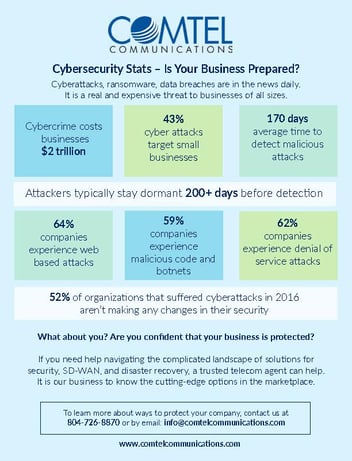Phishing, Smishing, and Vishing - How Do You Protect Your Employees?
Protecting your business from phishing, smishing, and vishing attacks is paramount in today's digital landscape. Phishing and its variations are malicious techniques employed by cybercriminals and can wreak havoc on organizations, leading to financial losses, data breaches, and damage to reputation.
Fortunately, we're here to dive into the world of phishing to help you understand what it is and how you can defend your business against it.
What are Phishing, Smishing, and Vishing?
Let's talk phishing–and not the kind that involves a river and a fishing rod.
Phishing attacks have become increasingly prevalent and sophisticated in recent years, posing a significant threat to businesses of all sizes. To effectively protect your employees, it is crucial to have a solid understanding of what phishing entails and how these attacks are orchestrated.
Phishing and its variants are cybercrime techniques where attackers masquerade as trustworthy entities, such as banks, email providers, or reputable organizations, to trick individuals into divulging sensitive information or performing actions that can compromise their security. These attacks primarily occur through email but can also occur via phone calls, text messages, or social media platforms.
Phishing Red Flags
There are several common types of phishing attacks to be aware of:
- Email phishing: This is the most prevalent form of phishing, where attackers send deceptive emails that appear legitimate, complete with logos, graphics, and language designed to deceive recipients. These emails often request sensitive information like login credentials or credit card details.
Phishing email statistics suggest that nearly 1.2% of emails are malicious, translating to 3.4 billion phishing emails daily.
- Spear phishing: In spear phishing attacks, cybercriminals target specific individuals or organizations, tailoring their messages to make them appear more personalized and authentic. They gather information about their victims through social engineering techniques, making their attacks more convincing and harder to detect.
- Smishing and vishing: Smishing refers to phishing attacks conducted through text messages, while vishing involves phishing attempts through voice calls. These methods rely on social engineering and urgency to deceive victims into providing personal information or taking immediate action. The average cost of a data breach caused by smishing or vishing is $3.6 million.
To execute these attacks, cybercriminals employ various tactics, such as:
- Spoofed websites mimic legitimate ones to deceive users into entering their login credentials or financial information.
- Malicious attachments or links that, when clicked, download malware onto the victim's device, allowing the attacker to gain unauthorized access or monitor their activities.
- Manipulative language, urgency, or fear tactics pressure individuals into disclosing sensitive information without thoroughly verifying the authenticity of the request.
By understanding the different types of phishing attacks and the tactics used by cybercriminals, businesses can educate their employees and implement proactive measures to mitigate the risk.
Consequences of Falling Victim to Phishing, Smishing, and Vishing
Falling victim to a phishing attack can have severe consequences for both individuals and organizations. Understanding the potential ramifications is crucial in emphasizing the importance of robust protection measures.
- Financial losses and data breaches: Phishing attacks often aim to extract sensitive financial information, such as credit card details or login credentials. Once obtained, cybercriminals can gain unauthorized access to bank accounts, conduct fraudulent transactions, or sell stolen data on the dark web. The financial impact can be substantial, resulting in monetary losses for individuals and organizations alike. Additionally, data breaches stemming from successful phishing attacks can lead to regulatory penalties, legal liabilities, and damage to a company's reputation.
- Damage to reputation and customer trust: Phishing attacks can compromise sensitive customer information, eroding confidence in an organization's ability to safeguard data. If customer data is misused or leaked, it can tarnish the company's reputation and lead to a loss of clientele. Rebuilding trust after a successful phishing attack can be challenging and time-consuming, potentially affecting long-term business relationships.
- Legal and regulatory implications: Organizations that fail to protect against phishing attacks adequately may face legal consequences. Depending on the industry and jurisdiction, specific regulations and compliance standards may exist related to data protection and privacy. Breaching these regulations can result in significant penalties, fines, and legal actions, exacerbating the financial and reputational damage caused by the attack.
Leveraging VoIP Phone Systems for Phishing, Smishing, and Vishing Protection
In the battle against phishing attacks, organizations can leverage their Voice over Internet Protocol (VoIP) systems to bolster their protection strategies. VoIP technology offers advanced features and capabilities that can enhance security and mitigate the risks associated with phishing attempts.
VoIP Security Features
VoIP systems can provide robust caller ID authentication mechanisms, allowing organizations to verify the authenticity of incoming calls. In addition to these measures, implementing industry-standard protocols like STIR/SHAKEN further enhances caller authentication. STIR (Secure Telephony Identity Revisited), and SHAKEN (Signature-based Handling of Asserted information using toKENs) are frameworks designed to combat caller ID spoofing and fraudulent calls.
STIR/SHAKEN digitally signs and verifies caller information to ensure its integrity. When a call is made, the originating service provider signs it with a digital signature, asserting its authenticity. The receiving service provider then verifies the signature to confirm that the caller's identity is legitimate.
By implementing STIR/SHAKEN, VoIP systems can detect and prevent spoofed calls, making it more difficult for attackers to impersonate trusted entities. This protocol enhances caller authentication by providing a standardized framework for validating the legitimacy of incoming calls, thus increasing trust and reducing the risk of falling victim to phishing attempts or other fraudulent activities.
Additionally, by implementing protocols like Secure Real-time Transport Protocol (SRTP) and Transport Layer Security (TLS), VoIP systems can authenticate and encrypt communication channels, reducing the risk of impersonation by attackers.
VoIP systems also include call analytics and fraud detection features. These capabilities can analyze call patterns, detect unusual or suspicious activities, and alert administrators to potential phishing attempts. By monitoring call traffic and identifying anomalies, organizations can proactively respond to phishing attacks and take appropriate measures to mitigate the risks.
VoIP Encryption Protocols
VoIP systems employ encryption protocols to ensure secure communication channels. Encryption safeguards the content of voice calls, making it more difficult for attackers to intercept and eavesdrop on sensitive conversations. Implementing protocols such as Secure Real-time Transport Protocol (SRTP) and Secure Socket Layer (SSL)/Transport Layer Security (TLS) helps protect against interception and tampering, strengthening overall security posture.
VoIP-based Employee Communication Tools
VoIP systems provide advanced security features such as Single Sign-On (SSO) and Multi-Factor Authentication (MFA). By implementing SSO, employees can minimize the number of passwords they need to manage, simplifying access to their VoIP system while ensuring stronger security measures. Additionally, utilizing VoIP voice calls for sensitive conversations and encrypted messaging platforms like SMS and MMS enhances confidentiality and mitigates the risk of phishing attacks targeting traditional email communication.
VoIP systems facilitate secure voice calls between employees, enabling confidential discussions without the risk of interception. Encouraging employees to use VoIP voice calls for sensitive conversations, such as discussing sensitive company information or sharing credentials, can reduce the likelihood of falling victim to phishing attacks targeting these exchanges.
VoIP systems also offer messaging platforms like SMS and MMS that can serve as secure channels for internal communication. These platforms provide end-to-end encryption, preventing unauthorized access to message content. Using encrypted VoIP messaging, employees can securely exchange sensitive information, reducing the chances of falling victim to phishing attacks that target traditional email communication.
Unified Communications and Security
VoIP systems can be instrumental when working in tandem with existing security measures and provide an additional layer of defense against phishing attacks. However, it's important to note that VoIP systems alone cannot guarantee complete protection. A holistic approach combining VoIP security features with other preventive measures is crucial for comprehensive defense.
Consider leveraging your VoIP system against these best practices for further protection against phishing attacks:
- Leverage Single Sign-On (SSO) capabilities to enhance security. SSO enables users to access multiple applications and systems with a single set of login credentials, reducing the risk of password-related vulnerabilities and unauthorized access.
- Utilize robust authentication mechanisms, such as multi-factor authentication (MFA)
- Regularly update your computer and phone software
- Educate employees on phishing threats and safe communication practices
- Regularly monitor and analyze call traffic within your VoIP system.
Find a Secure Partner
Finally, choose a secure VoIP provider to ensure the effectiveness of your phishing defense efforts. Be sure to select a provider that prioritizes security and offers robust features to protect against phishing attacks. Additionally, ensure that they have a strong reputation, comply with industry standards and regulations, and are available to support your business.
By partnering with a reliable VoIP service provider such as Simplicity VoIP, you can leverage their expertise, advanced security features, and ongoing support to enhance your phishing protection efforts.
Looking to optimize communication with a trusted provider?








